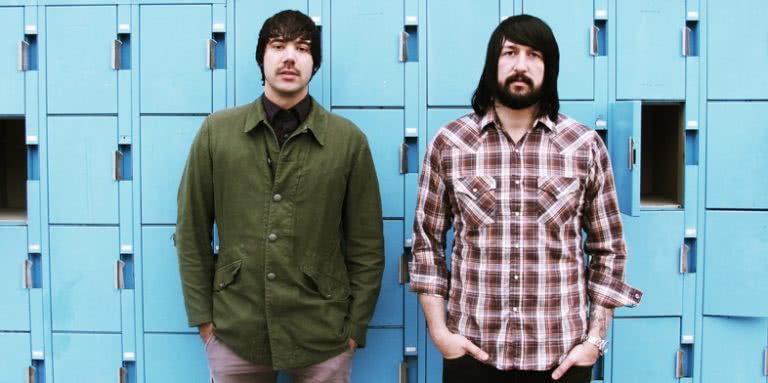Canada’s Death From Above 1979, otherwise known by the contraction DFA 1979, might be the most widely known and talked about underground punk rock band in the world. All the hype and adoration around the Montreal two-piece, comprising bass player Jesse F. Keeler and drummer/vocalist Sebastien Grainger, emerged from the release of only one album, 2004’sYou’re A Woman, I’m A Machine.
Just last month, and almost exactly ten years since the release of their debut, DFA 1979 dropped an unanticipated follow-up, The Physical World. The record came as an extra surprise, because the band officially broke up in 2006.
“It wasn’t always going to happen,” confirms Keeler. “The way we’re working these days is by just playing it by ear.” Alongside other activities, Keeler’s words reflect the occasion when DFA 1979 reformed for South By Southwest in 2011 and followed it up with a world tour, seeing them visit Australia for the Parklife festival.
“We don’t want to trap ourselves into anything that we’re not sure of or make any promises we don’t think we can keep,” explains the bassist. “We wanted to see if [after the reformation] we would be happy just playing again, and we were. The shows just kept coming and we just had to say, ‘No, we don’t want to play any more reunion shows,’ because we had done almost a year of them.
“In the end we decided that we’re either going to make new music and be a band again, or we’re going to stop playing these shows because we didn’t want to sully our good name. So we decided to make music again.”
While DFA 1979 had written an array of new material, Keeler admits the band wasn’t quite ready to perform the new tracks live. Instead, the pair opted to play tracks from its back catalogue while on the touring circuit. “We started writing all this new stuff, but we didn’t feel like it was ready to play out in front of people yet,” he says. “Then it got to a point where we were playing these shows, and [we had] all these other songs we wanted to play but we didn’t pull them out because they weren’t done. So we stopped playing, to make music.
“That’s what screwed our band in the first incarnation,” he admits. “We were on tour so much that we didn’t get the chance to make music, so it just started to lose all its point.”
Keeler now turns his attention to the writing process behind the songs on The Physical World. “The first song on the record [‘Cheap Talk’] is the first song that we wrote for the album, but the funny thing is it was just an instrumental. I wrote that song in 2005 and we never got around to finishing it. When we got back together in the studio we were like, ‘Let’s try and finish that one we never finished off.’ There were minor changes and Sebastien wrote the lyrics – that song was actually originally called ‘The Physical World’.
“While the lyrics changed and the title was given to the last track on the record, that song guided the rest of the album in both sound and concept,” explains Keeler. However, in recognition that the whole process sounds quite intense, he adds, “They were all really easy [songs to write]. Usually, I will have a bunch of riffs and I will say, ‘I think this is a song,’ and we will get together and figure out what the arrangement would be and Sebastien will freestyle vocals over the top of it and we will see if there is anything exciting in there off the bat.”
Keeler closes our chat by talking about the last song on the record, the one that ended up with the name ‘The Physical World’. “This was different in that I had a concept for what would be at the end of the record and had this idea that was a arpeggio-ing chord on a Juno 16 and I was like, ‘Let’s just play to that, let’s use it as the master clock,’ and we got into it and the song wrote itself.”


































